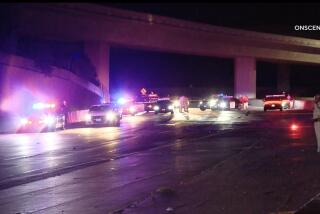Counselors Help Police Officers Cope With Trauma of Accident
- Share via
SANTA ANA — Police officers are accustomed to coping with emotionally taxing situations, but the Santa Ana Police Department’s staff psychologist said the traffic accident that claimed eight victims Sunday may prove to be particularly traumatic.
“They’re tough guys, and they deal with overwhelming events everyday, but this is a major event,” said Dr. Eric Gruever, who noted that “the bigger they are, the harder they fall. What happens in situations like this is that overwhelming feelings are not vocalized.”
Gruever was called to the scene of the accident Sunday evening to help police officers deal with the stress of the most deadly traffic accident in Orange County history.
“We have a very structured way of dealing with officers who are exposed to this kind of event, to help them give voice to their emotions,” Gruever said.
Police officers usually receive psychological training along with their regular training, so that they are prepared to deal with highly stressful situations. However, law enforcement agencies around the world, such as the FBI and the military, have found it increasingly necessary to provide additional psychological resources.
“The life of a cop is becoming more and more stressful and complex,” Gruever said.
In January, 1992, the Santa Ana Police Department instituted a program called Critical Incident Debriefing, a crisis intervention system which consists of a mental health professional and a team of police officers who serve as peer counselors.
“We try to set up an atmosphere in which people can open up,” Gruever said.
People exposed to traumatic events may experience anything ranging from fear to sadness to anger. Gruever stressed that there is no such thing as inappropriate feelings. The important thing is to acknowledge those feelings.
Even if people keep their feelings bottled up, they will eventually have to deal with them. Gruever said that 90% of people exposed to traumatic events are able to heal in three months.
“There are always some people in this kind of event who bury it. Six months or six years later, something in the environment may remind them of it,” Gruever said. “If they don’t vocalize their feelings, then they experience post-traumatic stress disorder.”
Gruever said post-traumatic stress disorder is triggered by an event that is overwhelming or out of the range of human experience. The problem starts when the person doesn’t deal with what he or she is feeling.
These people may then distance themselves from relatives, friends and events in society. They may start having nightmares or develop physiological problems, such as impotence.
“There is a general feeling of powerlessness,” Gruever said. “This is a time more than ever in which we need a community, a community in which we can share what’s inside us.”
Because everyone deals with traumatic incidents differently, Gruever said friends of accident victims or victims’ relatives should just follow their intuition in dealing with Sunday’s accident.
“We need to ask ourselves, ‘What would we like if we were that victim’s relative?’ ” Gruever said.
More to Read
Sign up for Essential California
The most important California stories and recommendations in your inbox every morning.
You may occasionally receive promotional content from the Los Angeles Times.










